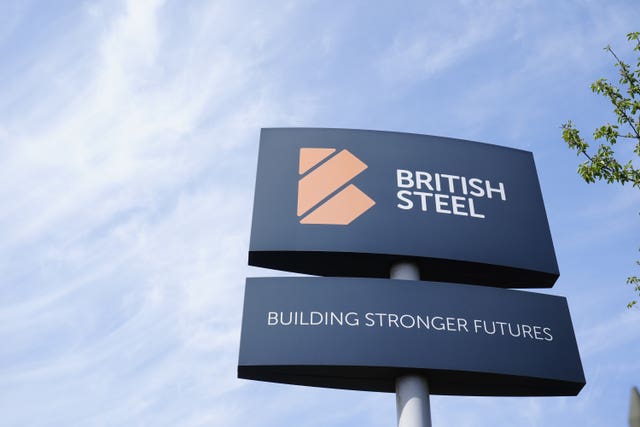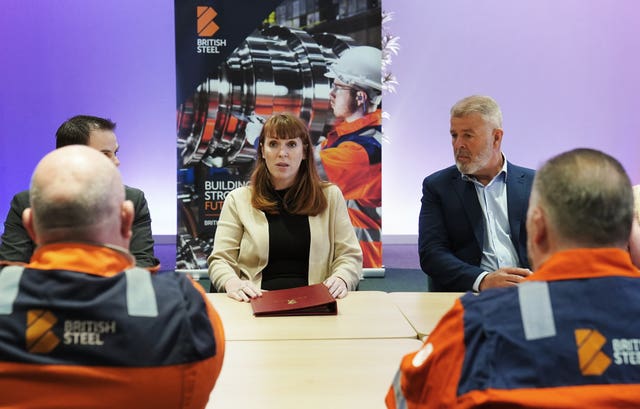Raw materials for Scunthorpe steel site ‘paid for’ – Rayner
The Deputy Prime Minister insisted that the North Lincolnshire site was ‘crucial’ to the industry in the UK.

A supply of raw materials needed in order to keep Scunthorpe steel plant operating have been paid for, Angela Rayner has said.
The Deputy Prime Minister insisted that the North Lincolnshire site was “crucial” to the industry in the UK.
It comes after Downing Street said the Government is “confident” that it would be able to secure the products, such as coking coal and iron ore, necessary to keep the site running.
Meanwhile, a union boss has suggested he is confident the technical expertise among staff at the plant would mean that it could be kept running while officials and the firm look to secure more new raw materials.
Speaking to reporters on a visit to Scunthorpe on Monday, Ms Rayner said: “We’ve got the raw materials they’ve been paid for, and we’re confident that the furnaces will continue to fire.”
She would not say whether this meant that the materials would be delivered to the site on Monday, but said that “everything’s in place”.
Ms Rayner’s visit to the site comes after the Prime Minister made a trip to Scunthorpe on Saturday, and told workers “you are the people who have kept this going”.
Sir Keir Starmer is now understood to be on a holiday with his family for the next few days.

The Prime Minister’s official spokesman had earlier told reporters: “We are now confident in securing the supply of materials needed. Obviously we will be working with the management to identify further raw materials needed to keep a steady pipeline, and to keep the furnaces burning.”
He added there are two ships carrying materials docked at Immingham port, also in North Lincolnshire, with “a third ship which is currently on route off the coast of Africa, which will be making its way to to the UK”.
British Steel has been in a race against time to avert a shutdown, and materials such as the coal and iron ore are necessary to prevent the cooling of the blast furnaces, which would risk irreparable damage to the plant systems.
Roy Rickhuss, general secretary of the Community trade union, said he was confident that the technical expertise available at the plant could keep the blast furnaces alive while more raw materials are sourced.
The furnaces could be “banked”, he said, keeping them at a “safe temperature to keep the stoves warm” for the immediate term.
Mr Rickhuss told the PA news agency: “The experts that we have in Scunthorpe now, people who’ve worked on blast furnaces for 30 years or more, they are now in control.
“They are working together to look at all the options.”
In the longer term, one of the furnaces could be drained of its molten metal and effectively turned off, through a process called a “salamander tap”.
This would “create more raw material resources to keep the other furnace going”, Mr Rickhuss said, preserving it until around mid-May.

“That should be more than enough time to get the raw materials in,” he added.
The Government passed emergency legislation designed to support the plant on Saturday after talks with Chinese owners Jingye broke down.
Business Secretary Jonathan Reynolds said on Sunday the Government had been prompted into action after learning that the firm had stopped ordering new raw materials to keep the plant running and planned on selling off supplies it already had.
Meanwhile, China has accused the UK of “politicising” trade co-operation, and suggested its companies could be put off investing in Britain if they were not treated “fairly”.
At a weekly press conference in Beijing, Chinese foreign ministry spokesman Lin Jian said: “We hope the British government treats Chinese enterprises investing and operating in the UK fairly and justly, protects their legitimate rights and interests, and avoids politicising and over-securitising economic and trade co-operation, so as not to affect the confidence of Chinese enterprises in investing and co-operating in the UK.”
Asked whether there was any concern that officials from Jingye may have purposefully attempted to shut down the blast furnaces, Downing Street said on Monday that they are “not aware” of any “sabotage” at the plant.
But it said that in the process of talks, it had become “clear” that the Chinese owners “wanted to shut the blast furnaces”.
“That wasn’t an outcome that we wanted to see,” the PM’s official spokesman said.
“They had decided not to order more raw materials.”
Number 10 insisted on Monday that officials would take a “consistent strategic approach to China” and said that “when it comes to critical national infrastructure we have rigorous processes and rules in place for managing our national security” and that investments are rooted in the UK’s national interest.
Asked whether a Chinese company could be involved in investment in British Steel in the future, the PM’s spokesman added: “I’m not going to get ahead of future commercial negotiations.”
British Steel announced on Monday the appointment of interim executives as the efforts continue to try and secure its future.
The company announced Allan Bell as interim chief executive officer and Lisa Coulson as interim chief commercial officer with immediate effect.
The appointments, signed off by the Business Secretary, are being made to ensure consistent and professional leadership at British Steel’s Scunthorpe site, said a statement.
A Liberal Democrat MP who was refused entry to Hong Kong last week meanwhile said it had been “naive” to allow British Steel to be sold to Chinese owners under the Conservatives.
Wera Hobhouse, a member of the Inter-Parliamentary Alliance on China (Ipac), which scrutinises British and Chinese relations, said the Labour Government had tried to negotiate with Jingye but “clearly the Chinese company was not interested in negotiating in good faith”.
“It looks to me that they wanted to run down that facility in order to make us then more dependent on Chinese steel,” she told BBC Radio 4’s PM programme.





